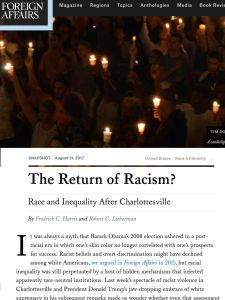Join getAbstract to access the summary!

Join getAbstract to access the summary!
Fredrick C. Harris and Robert C. Lieberman
The Return of Racism?
Race and Inequality After Charlottesville
Foreign Affairs, 2017
What's inside?
Calling out racism is important, but uprooting racial inequality necessitates institutional reform.
Recommendation
Following America’s 2016 presidential election, political commentators scrambled to explain Donald Trump’s surprise victory. Was racism the catalyst? While political scientists Fredrick C. Harris and Robert C. Lieberman concede that overt racism motivated some voters, they also point out how the candidate spoke to the growing socioeconomic despair felt among working-class whites. By illustrating how a variety of complex factors affected the election, Harris and Lieberman underscore the many difficulties involved in rooting out systemic racism.
Summary
About the Authors
Fredrick C. Harris is a Political Science Professor and Director of the Center on African American Politics and Society at Columbia University. Robert C. Lieberman is a Political Science Professor at Johns Hopkins University.

















Comment on this summary